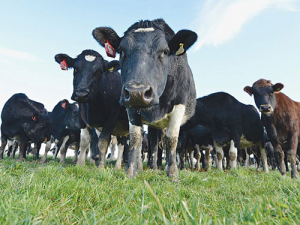MPI Hails Kiwifruit Boom as Horticulture Revenue Surges Past $9 Billion
Ministry for Primary Industries (MPI) Director General Ray Smith is giving a big shout-out to the horticulture sector, especially kiwifruit.
 MPI has confirmed that one of two Waimate district farms placed under restrictions last week has tested positive for Mycoplasma bovis infection.
MPI has confirmed that one of two Waimate district farms placed under restrictions last week has tested positive for Mycoplasma bovis infection.
The Ministry for Primary Industries (MPI) has confirmed that one of two Waimate district farms placed under restrictions last week has tested positive for Mycoplasma bovis infection.
Testing is ongoing on the second property, which is under precautionary restrictions due to its association with the new infected farm.
In addition to these two farms, the Ministry has today placed a further farm in the area under the same controls while further testing is underway to determine if it too is infected.
MPI’s Incident Controller of the Mycoplasma bovis Response, David Yard, says all three farms are in the same district and a couple of them neighbour Van Leeuwen Dairy Group properties.
“All these farms are under Restricted Place Notices, controlling the movement of animals and other risk goods on and off the farms.
“We still have a lot of work to do ascertaining the source of infection at the confirmed infected property and building a picture of animal movements between all three farms and possible other farms.”
Mycoplasma bovis is spread through close contact between animals and through the direct movement of cattle between properties.
Yard says the key to protecting farms is practicing good on-farm biosecurity measures.
“There is a lot of thorough information on MPI’s website about keeping equipment clean, buffer fencing property boundaries and about safely moving animals between properties.”
All three farms were identified through the Ministry’s comprehensive, science-based surveillance and tracing programme, which has now tested more than 40,000 samples of milk, blood and swabs.
“Our programme has been developed by MPI’s skilled scientists and veterinarians, along with advice from Massey University’s EpiCentre - the largest veterinary epidemiology training and research centre in Australasia.
“The surveillance is the most appropriate for the situation we are dealing with and we’re leaving no stone unturned in our bid to understand where this disease is present and manage it.”
Yard says he wants to assure farmers that if Mycoplasma bovis is present, it will be found.
MPI’s experienced response team is now planning for how the new infected place will be managed and continuing testing of samples from the two other properties.
“This is a very stressful time for everyone involved, and I’d like assure farmers that MPI is working hard to on their behalf to locate and contain this disease,” Yard says.
Farmers who have concerns about someone doing it tough can call the Mycoplasma bovis Farmer Support Line 027 444 9380 or their local Rural Support Trust on 0800 787 254 (0800 RURAL HELP).
A solid recovery of global dairy prices this year makes a $9.50/kgMS milk price almost a shoo-in for this season.
As New Zealand marks the United Nations’ International Year of the Woman Farmer 2026 (IYWF 2026), industry leaders are challenging the misconception that women only support farming.
Fonterra’s impending exit from the Australian dairy industry is a major event but the story doesn’t change too much for farmers.
Expect greater collaboration between Massey University’s school of Agriculture and Environment and Ireland’s leading agriculture university, the University College of Dublin (UCD), in the future.
A partnership between Torere Macadamias Ltd and the Riddet Institute aims to unlock value from macadamia nuts while growing the next generation of Māori agribusiness researchers.
A new partnership between Dairy Women’s Network (DWN) and NZAgbiz aims to make evidence-based calf rearing practices accessible to all farm teams.